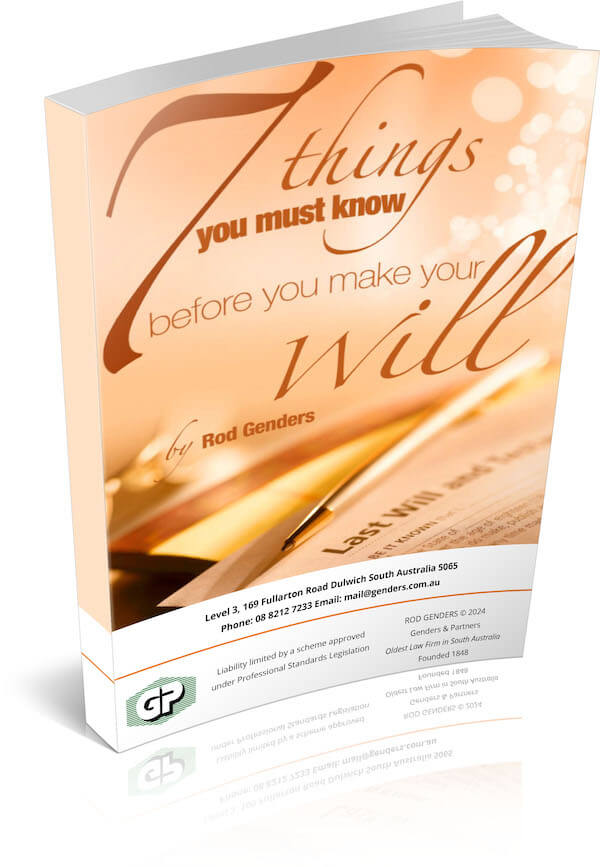
With Australians living longer than ever, their physical health is often declining slower than their mental capacity, requiring close family members to assume the role of agents and substitute decision makers for financial and legal matters, generally by way of an enduring power of attorney.
It is not surprising if you have never heard of ‘ademption’. Ademption is a legal term derived from a Latin word meaning ‘a taking away’.
Ademption occurs when property (either personal or real estate) gifted under a Will is no longer in the Will-maker’s (Testator’s) estate when they die.
A classic example is where the Testator’s main residence is gifted to a beneficiary in the Will, but the main residence has been sold during their lifetime to fund the purchase of an accommodation bond for an aged care facility.
In this circumstance, the specific gift of the main residence has been ‘adeemed’, generally meaning that the gift of the main residence to the beneficiary fails.
There is an assumption that if a specific gift of an item or property is no longer in the estate of the Testator, that it is their intention that the beneficiary of the specific gift will receive nothing in its place.
So, ademption can lead to instances where the distribution of the estate leads to unfair or unexpected outcomes.
There are circumstances where an agent under power of attorney will have to make a difficult decision that may ultimately impact on a beneficiary’s interest following the death of a Testator.
An attorney may at times be faced with conflicting duties and interests.
On the one hand, the attorney has a duty to act in the best interest of their principal (the donor of the power). So if the principal required supported accommodation, the agent may have to sell the house to fund an accommodation bond.
On the other hand, the attorney themselves may be a beneficiary of the donor’s Will. This could give rise to a material conflict if the attorney was a beneficiary of the residuary estate.
For example, if the house had been specifically gifted to another beneficiary in the Will, then as a result of selling the house, the attorney may ultimately benefit from the proceeds of the accommodation bond: an interest they would not have had if the estate had retained the house.
In these circumstances, the attorney should remember their fiduciary duty to keep written records, and to take professional advice.
It is essential that attorneys ensure they keep their own interests, money and property separate from the principal’s interests, money and property at all times.
Attorneys are required to ensure they keep proper accounts and records, which is vital when an asset that is specifically gifted in a Will is sold, as a court could make an alteration of a beneficiary’s interest.
Careful advice ahead of time, and a properly drafted Will can head-off difficulties that an attorney or executor may experience down the track.
If, for example, the Testator is of advancing years and more likely to need to be placed in an aged care facility, it would be unwise to include in a Will a specific gift of the main residence if there are no other assets that could fund an accommodation bond and upkeep of the Testator for the remainder of their life.
Instead, if you as the Testator intend to make a specific gift to a beneficiary, you could instead consider making a gift of a percentage of their residuary estate.
Reviewing and updating your estate planning documents when there is a significant change in your life is crucial.
Genders and Partners is the oldest law firm in South Australia, established 1848.
Contact us to learn how to protect yourself, your family and your assets through modern integrated estate planning solutions, by visiting our website today and schedule a free no obligation telephone consultation to find out how they can help you and yours.
Remember – any mistakes you make in your estate planning documents won’t become apparent until after it’s too late for you to fix them. Get proper advice, and do it right.
It is also vitally important that you keep your estate plan up to date – it is not a set-and-forget exercise.
To learn how to protect yourself, your family and your assets, by creating a professionally-made estate plan, claim your FREE 15 minute Telephone Consultation
eBook “7 Things You Must Know Before You Make Your Will”
In this eBook you will Learn:

Why home-made Wills can be a LOT more expensive than you might think.
The secret weapons used by the rich & powerful to protect their assets, and transfer their wealth two or three generations ahead.
How Estate and Trustee Companies make BIG money from “free” Wills.
The Most Common Estate Planning Mistakes, how they can cost your family a fortune, and How to Avoid Them.
The Elements of a Sound Estate Plan – why a Will alone is not enough.
How to Make Sure Your Assets Stay in Your Family and are not lost to creditors, lawsuits or ex-spouses.
How to guard against challenges to your Estate after you’re gone.







